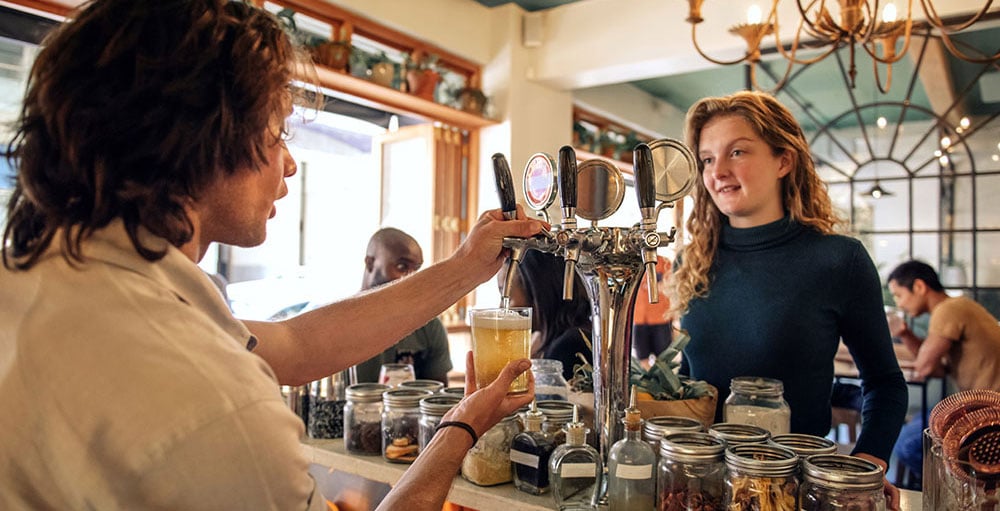While servers should know their legal responsibilities related to alcohol service, some myths persist in the industry.
Everywhere in the United States, it’s common knowledge that the legal drinking age is 21 and that to drive, your blood alcohol concentration (BAC) needs to be below .08%. Alcohol servers must be aware of these important laws and ensure they are followed strictly and without exception — or they could face harsh legal consequences.
However, there are some myths that are pervasive when it comes to alcohol service — and even the savviest servers may not be certain whether these are fact or fiction.
Let’s bust 9 of the most common alcohol service myths.
Myth #1: You must refuse alcohol service to a pregnant woman.
Whether you agree with it or not, you cannot refuse alcohol service to a woman because she’s pregnant. That is considered discrimination based on sex. This probably won’t come up frequently when serving alcohol, but if it does, know the law to avoid liability.
Myth #2: It’s illegal for alcohol servers to drink while working.
While in your state there may be no specific law against drinking on the job, it’s best practice for companies to implement a policy that employees must not consume alcohol during their shift. There can be exceptions, of course, but in general it’s best for all servers and other staff to be alert, focused on customers and ready to tackle their shift in sobriety.
Myth #3: It’s acceptable to drink and serve alcohol after hours.
In most states, alcohol service needs to stop at 2 a.m. Even for staff, it’s against the law to consume or serve alcohol after the hours stipulated on the business’s liquor license. These hours of operation need to be strictly followed.
Myth #4: Alcohol servers must be at least 21 years old.
This depends on the state where the establishment is located. In some states, servers do need to be 21 years or older. In others, they need to be 18 or older. Whether you’re an employer or server, everyone needs to be aware of the laws specific to your state about the minimum permissible age for alcohol servers.
Myth #5: If minors are with parents or guardians, the older customers can pass alcohol to the minors or give them permission to drink.
It doesn’t matter if the parent or guardian gives permission for someone under 21 to drink — this is illegal. Even if a parent is present and the minor is turning 21 in a week, if you see a drink being passed to a minor, you must stop alcohol service to everyone at the table. There is no gray area in the law when it comes to serving alcohol to minors.
Myth #6: Customers can’t bring alcohol from home to your establishment.
There’s no law specifically prohibiting customers from bringing a special bottle of wine or other alcoholic beverage from home. This is generally up to the particular establishment. However, establishments that wish to allow it may have to obtain a BYOB permit along with their liquor license, depending on the region where the business is located. Most licensed businesses don’t allow customers to bring alcohol, and those who do may also charge a “corking fee” or other small cost to make it worth their while.
Myth #7: It’s okay to keep selling alcohol to an intoxicated person — especially if they got drunk at your bar.
There is no situation that makes it acceptable to sell or serve more alcohol to someone who is visibly intoxicated. Laws are in place to prevent this, and some of these laws specifically hold both the employer and servers responsible. Anyone who passes alcohol to an intoxicated person could be legally liable — whether it’s their friend, a server or a bartender. Know the signs of intoxication, and ensure anyone who’s exhibiting these signs is politely and firmly cut off.
Myth #8: Drink specials like “ladies’ nights” are a great way to draw in customers and cash.
In some states, you can’t offer special drink prices based on sex, such as free or heavily discounted drinks on ladies’ nights. Other drink specials, such as two-for-one drinks, may be prohibited to prevent people from becoming dangerously drunk. Check your local area’s regulations on drink specials!
Myth #9: Servers don’t need alcohol server training.
In most states, an alcohol server must have a valid Alcohol Server Certificate to be employed in a licensed business. The employer has to keep records of employees’ certificates, and the liquor authority can ask to see these records at any time. In states where training is not required by law, many employers still make it a requirement in order to protect their brand and minimize risks of alcohol service liability — so it’s always a good idea to get your certificate!
Learn more about why getting your alcohol server certificate is important, and how training helps you conduct your responsibilities as an alcohol server effectively.
Getting your Alcohol Server Certificate will help you understand your legal responsibilities. Userve offers comprehensive, completely online Alcohol Server Courses that lets you complete training from the comfort of your home. It’s easy to enroll and finish training at your own pace to achieve your career goals!

